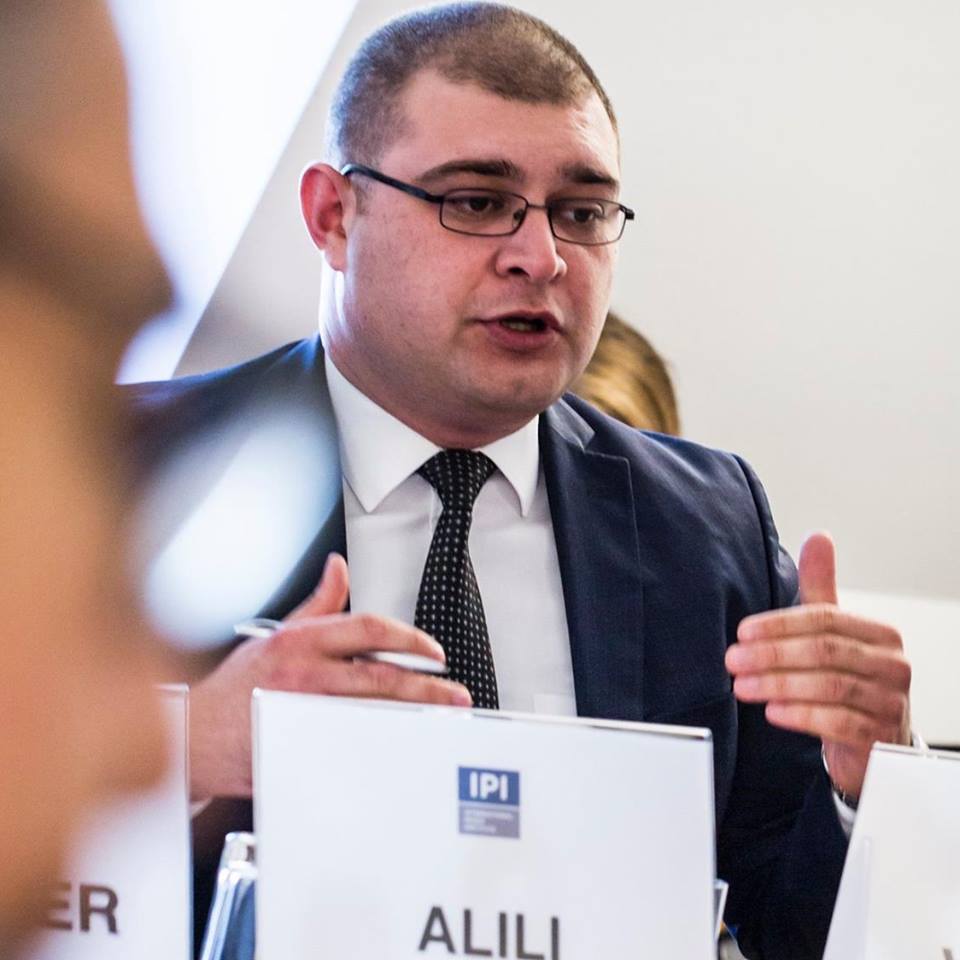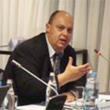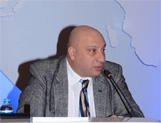Azerbaijan in 2020: Recent Developments and Future Foreign Policy Challenges[Over]  By Ahmad Alili, Head of Research, Caucasus Policy Analysis Center, Baku
By Ahmad Alili, Head of Research, Caucasus Policy Analysis Center, Baku
At the dawn of the unipolar international system – following the collapse of the Communist system in Eastern Europe and the South Caucasus – “the end of history” was announced. It was expected that the benevolent hegemony of the United States would last for many decades to come – liberal values and democracy would be spread to each corner of the world. The events of recent years and the chaos in the international order shows that the world is transforming from a unipolar world into a multipolar one. This transformation process has its reverberations in regions such as the South Caucasus. READ MORE
Special but Not Quite Strategic[Over]  By Benyamin Poghosyan, PhD, Chairman, Center for Political and Economic Strategic Studies By Benyamin Poghosyan, PhD, Chairman, Center for Political and Economic Strategic Studies
Two key topics concerning Georgia dominated the attention of the international media and expert community interested in the South Caucasus in past week. One was the outbreak of the novel Coronavirus and the growing number of cases identified in Georgia; the second issue was connected with domestic politics.[…] However, from regional perspective the key event of the past week was the official visit of Armenian Prime Minister Nikol Pashinyan to Georgia on March 3 - 4. READ MORE
Precarious Situation in Iran Doesn’t Mean State-collapse Soon[Over]  By Benyamin Poghosyan, PhD, Chairman, Center for Political and Economic Strategic Studies By Benyamin Poghosyan, PhD, Chairman, Center for Political and Economic Strategic Studies
On February 21, 2020 Iranians went to polling stations to elect their new parliament. Despite all the statements of Iran's leadership, including of the Supreme Leader Khamenei, of the importance of a high turnout, only 42 percent of registered voters casted their ballots, the lowest figure since the 1979 Islamic Revolution. Many inside and outside Iran saw this low turnout as a tacit protest of a large part of the electorate against the Guardian Council's decision to cancel the registration of many moderate and reformist candidates. Supreme Leader blamed the low turnout on the "negative propaganda" about the new coronavirus by Iran's enemies. READ MORE
Armenia and the US: Time for New Thinking[Over]  By Eduard Abrahamyan, Senior Fellow with the London-based Institute for Statecraft By Eduard Abrahamyan, Senior Fellow with the London-based Institute for Statecraft
Armenia’s 2018 Velvet Revolution raised hopes for a reinvigoration of the country’s decades-long partnership with the U.S. However, this relationship remains stagnant, despite the visit of a U.S. delegation led by National Security Advisor John Bolton in October 2018 and the subsequent visit of Deputy Assistant Secretary George Kent to Yerevan in May 2019, resulting in the formal elevation of Armenia’s relations with the U.S. to the level of “strategic dialogue.” Moreover, Yerevan’s decision to dispatch a military-humanitarian mission to Syria remains an irritant in its interaction with Washington.
READ MORE
Will Putin Allow Belarus to Play a Balancing Game?[Over]  By Benyamin Poghosyan, PhD, Chairman, Center for Political and Economic Strategic Studies By Benyamin Poghosyan, PhD, Chairman, Center for Political and Economic Strategic Studies
With Pompeo due in Minsk this week, and the Belarus presidential elections on the horizon, Moscow and Minsk have some difficult decisions to take.
Relations between Russia and Belarus are one of the hotly debated issues among pundits dealing with the politics of the post-Soviet space. Till recently bilateral relations were focused on economic cooperation, and more particularly, on the price of Russian gas and oil delivered to Belarus. In 2019 the accent shifted towards the practical implementation of the 1999 Union State treaty. The looming power transition in Russia in 2024, when President Putin fourth Presidential term expires, has inflamed the debate on the possibility of President Putin becoming the President of the Union state after 2024. This scenario was discussed as a possible way for President Putin to extend his power beyond 2024. READ MORE
The Uncertain Future of EU Enlargement: Implications for the South Caucasus[Over]  By Benyamin Poghosyan, PhD, Executive Director, Political Science Association of Armenia By Benyamin Poghosyan, PhD, Executive Director, Political Science Association of Armenia
In 2019, the EU and six Partner states are celebrating the 10th anniversary of the Eastern Partnership (EaP) program. Many conferences, expert workshops and other events were organized to assess the success and failures of the EaP. Meanwhile, alongside assessments of the past, the future of the program is also being actively discussed. EU even launched the ‘Structured Consultation” on the future strategic direction of the EaP and tasked the European Commission and the European External Action Service to present proposals. Member States and Eastern Partners, as well as other actors, including civil society, academia and think-tanks were invited to share their views on a new post-2020 policy framework, and the perspectives of EU enlargement. READ MORE
- December 24, 2019 21:46PM
Why Strong Armenia is Beneficial for both Russia and the US[Over]  By Benyamin Poghosyan, PhD, Executive Director, Political Science Association of Armenia By Benyamin Poghosyan, PhD, Executive Director, Political Science Association of Armenia
The South Caucasus always has quite complicated geopolitics. Russia, the US, the EU, Iran, Turkey, and China all have interests here. Armenia, Azerbaijan, and Georgia have different domestic political structures and cultures. Besides that, their national security threat perception and foreign policy goals do not coincide with each other. The protracted conflicts in Nagorno Karabakh, Abkhazia, and South Ossetia make the regional geopolitics even more complicated. All actors involved in the South Caucasus seek to exploit these conflicts to pursue their national interests; meanwhile, conflicting parties themselves have an absolutely different understanding on how these conflicts may be resolved. READ MORE
- December 10, 2019 23:02PM
South Caucasus in 2020[Over]  By Benyamin Poghosyan, PhD, Executive Director, Political Science Association of Armenia By Benyamin Poghosyan, PhD, Executive Director, Political Science Association of Armenia
The international security architecture is undergoing tremendous transformations. The relative decline of the US influence, rising China, more confident Russia, turmoil in the Middle East, rift in transatlantic relations and growing populism are the key patterns of current international relations. These developments are influencing virtually all regions of the world. Changes are not circumventing South Caucasus too. The region witnessed Armenian “Velvet revolution” in 2018, the protests and change of government in Georgia in June – September 2019 and, most recently, significant political transformations in Azerbaijan resulting in resignation of many key representatives of old ruling elites. READ MORE
- November 26, 2019 08:33AM
China's Underestimated Strategic Engagement in Central Asia[Over]  By Armine Arzumanyan, Graduate of Renmin University, PR of China By Armine Arzumanyan, Graduate of Renmin University, PR of China
China's main goals in Central Asia may not directly hint at the region's long-term strategic importance, but the outcomes of China's engagement in the region clearly show concrete signs of it. China's emergence as the dominant actor in the region’s energy and infrastructure sectors, along with its growing presence as the lender of choice for Central Asia, has had deep consequences as Beijing has quietly cultivated the defense component of its newfound presence in region. Though relatively little studied, China's energy-infrastructure-defense tridimensional approach is of immense importance. READ MORE.
- November 20, 2019 07:00AM
Russia, China and the West. And Armenia in the Middle[Over]  By Benyamin Poghosyan, PhD, Executive Director, Political Science Association of Armenia By Benyamin Poghosyan, PhD, Executive Director, Political Science Association of Armenia
Prospects of Russia - China relations are currently hotly debated by international security pundits. The West in general, and the US in particular, see these two states as key adversaries seeking to undermine the international world order. Simultaneously, the prevailing mood among Western expert and academic circles is confident that, at the end of the day, China is a more significant challenge to Russia than it is to the West, given the vast and scarcely populated areas of Siberia and the Russian Far East bordering China. READ MORE
- November 20, 2019 06:50AM
Perspectives of EU – South Caucasus Relations[Over]  By Benyamin Poghosyan, PhD, Executive Director, Political Science Association of Armenia By Benyamin Poghosyan, PhD, Executive Director, Political Science Association of Armenia
South Caucasus is a part of EU’s Eastern Partnership program. Launched in 2009, the Eastern Partnership envisages fostering relations between the EU and six former Soviet Union republics – Armenia, Azerbaijan, Belarus, Georgia, Moldova and Ukraine. The key goal of this program is the signature of Association and Deep and Comprehensive Free Trade Area agreements to bring about political association and economic integration. The top priority for the EU has been the political and economic development of the region, as Brussels did not want to have a permanent source of instability in its immediate neighborhood. READ MORE
- September 16, 2019 21:21PM
Russia – Turkey relations. Implications for the South Caucasus[Over]  By Benyamin Poghosyan, PhD, Executive Director, Political Science Association of Armenia By Benyamin Poghosyan, PhD, Executive Director, Political Science Association of Armenia
In recent years, Russia – Turkey relations have gone through tremendous transformations. In November 2015, they entered the phase of acute crisis with no hope of quick improvements. However, in summer 2016 the process of reconciliation was launched, which resulted in bringing an unprecedented level of cooperation in economy and in the military-technical sphere. What are the main factors for such change and what does the current Russia – Turkey partnership mean for the South Caucasus. READ MORE
The End of the Multi-vector World and the Creation of New Dividing Lines: Implications for Armenia[Over]  By Benyamin Poghosyan, PhD, Executive Director, Political Science Association of Armenia By Benyamin Poghosyan, PhD, Executive Director, Political Science Association of Armenia
The expert community dealing with international relations and security studies is involved in active debates regarding the current phase and future developments of the international security architecture. The prevailing topic is the end of United States (US) unipolar hegemony and establishment of more multi-polar, but an unstable and more complicated world with less respect towards the international laws and growing emphasis on coercive policy including threats and use of military force, economic sanctions and hybrid tactics. READ MORE
How Will Uzbekistan Become A Regional Transit Hub?[Over]  By Fuad Shahbazov, Baku-based independent regional security and defence analyst By Fuad Shahbazov, Baku-based independent regional security and defence analyst
On 5th April of 2019, a meeting of the railway authorities of Kazakhstan, China, Iran, Turkmenistan, and Uzbekistan took place in Almaty dedicated to advancing cargo traffic along the North-South Transit Corridor. In fact, the participation of Uzbekistan in the project will shorten the route of goods from China to Iran and forward. Being a part of the ambitious North-South Transit Corridor, the China-Kazakhstan-Turkmenistan-Uzbekistan-Iran railway can shape the geopolitics of Central Asia. READ MORE
Re-evaluating the idea of ‘Putinism’[Over]  By Eduard Abrahamyan, Wider Black Sea & Central Asia regional security analyst
By Eduard Abrahamyan, Wider Black Sea & Central Asia regional security analyst
While the standoff between adversaries rages on, recent weeks saw an intensified communication between American and Russian high-level officials over the wide array of issues on which Moscow and Washington have contrasting views. On May 14, U.S. Secretary of State Mike Pompeo met with his Russian counterpart, Foreign Minister Sergey Lavrov, and later with President Vladimir Putin in the Russian Black Sea city of Sochi. READ MORE
Eurasia After the Rise of China: The Role of Armenia[Over]  By Armine Arzumanyan, Student, Renmin University, PR of China By Armine Arzumanyan, Student, Renmin University, PR of China
Aiming to create a future where all roads lead to Beijing, China now plans to obtain a global role in politics by putting itself at the centre of global economic affairs through the Belt and Road Initiative (BRI), which is the most ambitious geo-economic vision in recent history. The BRI and its goals, that have been given many different evaluations, has suggested cooperation in Central Asia, West Asia and Eastern Europe. To maintain a balanced security environment at the conjunction of Europe and Asia and to ensure a successful realization of the BRI, China will need a reliable strategic partner in the South Caucasus. This essay points out why Armenia is most likely to be the strategic ally China will need, drawing out the main perspectives and paradigms for more advanced Sino-Armenian relations. READ MORE
New Caspian–Black Sea Transit Corridor Boosts Geostrategic Importance of South Caucasus[Over]  By Fuad Shahbazov, Baku-based independent regional security and defence analyst By Fuad Shahbazov, Baku-based independent regional security and defence analyst
On March 4, Romania, Azerbaijan, Georgia and Turkmenistan held a ministerial meeting in Bucharest—the first such quadripartite gathering for these governments. During this meeting of their foreign ministers, the parties issued a joint statement reaffirming mutual respect for each other’s sovereignty, territorial integrity and inviolability of their internationally recognized borders. Additionally, a number of other important issues were raised in Bucharest, including a discussion on establishing a multimodal corridor for the transport of goods between the Black Sea and Caspian Sea basins, a project officially named the Caspian Sea–Black Sea International Transport Corridor (ITC-CSBS). READ MORE
Armenia's "Other Choices"?[Over]  By Benyamin Poghosyan, PhD, Executive Director, Political Science Association of Armenia By Benyamin Poghosyan, PhD, Executive Director, Political Science Association of Armenia
It is time for Armenia to deepen its relations with Iran and China, out of necessity rather than choice.
Armenia continues to face a hard geopolitical reality. The 2018 Velvet revolution has brought hope of the possibility of significant and systemic changes in domestic policy - including in the fight against corruption, furthering the rule of law, and reducing monopolies over key imports and exports from and to Armenia. However, the revolution did not change the geopolitical juncture around Armenia. Yerevan continues to face joint Azerbaijani-Turkish pressure to make concessions in the Karabakh conflict settlement process. READ MORE
THAAD in Romania: Bucharest on the Moving Sands of Great Powers’ Competition[Over]  By George Vlad Niculescu, Head of Research, the European Geopolitical Forum By George Vlad Niculescu, Head of Research, the European Geopolitical Forum
On 11 April 2019, NATO confirmed US plans to deploy of the Terminal High Altitude Area Defense (THAAD) system to Romania. According to NATO officials, the United States will fulfil its commitment to NATO’s Ballistic Missile Defence by the temporary deployment of a THAAD system to Deveselu in Romania. The scheduled work is part of the United States European Phased Adaptive Approach to ballistic missile defence, which has been implemented since September 2009. In response, Russian Deputy Minister of Foreign Affairs Alexander Grushko said: “Russia is “closely following” the temporary deployment of a THAAD system to the Deveselu base in Romania.” READ MORE.
Kazakhstan’s Successful Two-Years Membership in the United Nations Security Council[Over]  By the European Geopolitical Forum Editorial Staff By the European Geopolitical Forum Editorial Staff
In 2018, the Republic of Kazakhstan successfully completed its two-year membership of the United Nations Security Council (UNSC). Over this period, Astana acted as an honest broker, known for its effective balanced approach and neutrality against all international actors.
In just two years, representatives of Kazakhstan took part in more than 1,000 open and closed UNSC meetings, 38 informal events, and contributed to 115 resolutions and 48 statements of the Council Presidency. READ MORE. See the original on-line media publication here
Historic and New Silk Road Perspectives of the European Integration of Georgia[Over]  By Nika Chitadze, PhD, Director, Center for International Studies, International Black Sea University, Tbilisi By Nika Chitadze, PhD, Director, Center for International Studies, International Black Sea University, Tbilisi
Georgia is a small country on the crossroads of Europe and Asia. At the same time, together with the economic benefits for the country, which had and has its important geopolitical place between different civilizations, there were frequent confrontations for the gaining control over Georgia and Caucasus Region due to the fact, that modern territory of Georgia was located on one of the branch of the Great Silk Road. Historic Silk Road was functioning since 8-7-th Centuries B.C. till the middle of 15-th Century.
After the collapse of Constantinople in 1453, the interregional Silk Road lost its function, and Georgia was in a very difficult situation, that spanned centuries.
READ MORE
US-Turkish Relations in Crisis[Over]  By Eugene Kogan, Tbilisi-based defence and security expert By Eugene Kogan, Tbilisi-based defence and security expert
In recent years, Turkish President Erdogan has turned his country towards the East. In so doing, he is risking a break with his NATO allies in the West.
The failed coup in Turkey on 15 July 2016 has been a turning point in US-Turkey relations. The coup has left many questions from US officials unanswered by their Turkish counterparts. In addition, President Recep Tayyip Erdogan's request for the extradition of US-born Muslim cleric Fethullah Gulen, whom Erdogan called the head behind the coup, was repeatedly rejected by the US Department of Justice because of insufficient evidence. This point was disputed by Turkish officials who claimed that they had provided sufficient evidence of Gulen's complicity in the coup. READ MORE
The Seventh Corridor of the Belt and Road Initiative[Over]  By Benyamin Poghosyan, PhD, Executive Director, Political Science Association of Armenia By Benyamin Poghosyan, PhD, Executive Director, Political Science Association of Armenia
Since the launch of Chinese “One Belt, One Road (OBOR)” initiative in September 2013 later renamed as "Belt and Road Initiative (BRI)", the bulk of academic research has been devoted to the evaluation of the suggested land and maritime routes of this gigantic project. In recent years the main focus of the Western and especially American expert community was the link between BRI and Chinese foreign policy strategy with more emphasize of possible negative ramifications of the project for the states involved. The terms such as “debt diplomacy” or “debt trap” were disseminating more and more in both academic and political circles. READ MORE
America's Offshore Balancing in Action[Over]  By Benyamin Poghosyan, PhD, Executive Director, Political Science Association of Armenia By Benyamin Poghosyan, PhD, Executive Director, Political Science Association of Armenia
US President Donald J. Trump recent decision to withdraw American forces from Syria caught everyone by surprise: the Washington establishment, foreign policy pundits and everyone else who follow the Middle East Geopolitics. Given the top priority which President Trump has attached to the containment of Iran and curbing its activities in the Middle East, many believed that US presence in Syria should have been either expanded or at least stayed the same. READ MORE
Will the Syrian Kurds Strike a Deal with Moscow?[Over]
 By Fuad Shahbazov, Baku-based independent regional security and defence analyst By Fuad Shahbazov, Baku-based independent regional security and defence analyst
President Donald Trump’s announcement at the end of 2018 that he would withdraw U.S. troops from Syria came as a surprise to all parties involved, sparking particular concerns among America’s Syrian Kurdish allies. The move followed President Trump’s declaration of victory over ISIS after a four-year military campaign fighting alongside Syrian Kurdish forces. This sudden and unexpected decision has been widely criticized not only by allies but also inside the White House, with many analysts arguing that the U.S. withdrawal will expose the Syrian Kurds to an attack by Turkey READ MORE
|
|